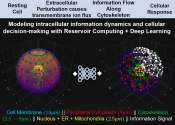Using metal ion-linked nanostructures to improve immune response and boost breast tumor treatment
Immune checkpoint blockade (ICB) is one of the primary methods of tumor immunotherapy. However, clinical data have shown that only a portion of patients respond to ICB treatment. Since the tumor's immune-suppressive environment ...









